|
|
|
Sort Order |
|
|
|
Items / Page
|
|
|
|
|
|
|
| Srl | Item |
| 1 |
ID:
121113
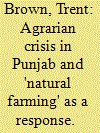

|
|
|
|
|
| Publication |
2013.
|
| Summary/Abstract |
After four and a half decades of Green Revolution agrarian development, the state of Punjab is now, according to many commentators, in a state of social, economic and ecological crisis. In this paper, I interpret this crisis through a Gramscian lens as a 'crisis of authority', in the sense that while the dominant paradigm (the Green Revolution) can no longer provide solutions to the state's most pressing social problems, there is no clear single alternative either. This situation provides a political opportunity for non-hegemonic groups to articulate various other possibilities that address fundamental questions. This paper focuses on the work of one such group, the Kheti Virasat Mission (KVM). KVM is a civil society organisation that promotes 'natural farming' as a solution to the crisis in Punjab: natural farming is a chemical-free method of farming, which relies exclusively on materials available at the local level. This paper looks at KVM's methods of intervening in the crisis situation and examines the difficulties faced at the level of implementation. It argues that KVM's successes and failures highlight the uneven capacities of different classes and social groups to effectively respond to a 'crisis of authority'.
|
|
|
|
|
|
|
|
|
|
|
|
|
|
|
|
| 2 |
ID:
175480
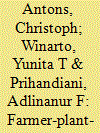

|
|
|
|
|
| Summary/Abstract |
In the last two decades, some Javanese rice farmers have learned to be plant breeders with the help of Farmer Field Schools for Participatory Plant Breeding. However, they have experienced problems with seed and intellectual property laws primarily focused on the strengthening of the seed industry and compliance with development plans. A number of farmers have been prosecuted for experimenting with seeds, prompting a partly successful challenge to relevant provisions in Indonesia’s Constitutional Court. Subsequent legislative changes have restored some farmers’ rights, but also brought new reporting requirements and limitations. Using James Scott’s concept of “transformative state simplifications,” this article shows that legal challenges to regulations are just one strategy of self-help. The political reform process and possibility for constitutional challenges have opened up space for debates about how farmers can benefit from laws that seek to regulate their cultivars. The United Nations Declaration on the Rights of Peasants and other developments are likely to intensify discussions about what precisely various laws mean by their encouragement of “small farmer varieties,” “food sovereignty,” and a “sustainable agricultural cultivation system.”
|
|
|
|
|
|
|
|
|
|
|
|
|
|
|
|
| 3 |
ID:
154555
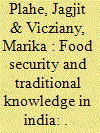

|
|
|
|
|
| Summary/Abstract |
In this first paper, we explain why traditional knowledge is an important theme in the study of Indian agriculture, especially given the crises routinely facing poor, smallholder farmers. We begin with an overview of some of the key authors who have written about the problems facing small farmers both within and outside India. Different authors have focused on different aspects of the benefits that can be derived from the local knowledge and skills of farmers, but these do not always pertain to organic farming. Our interest in organic farming is specifically about ‘traditional’ knowledge. With the industrialisation of agriculture in India and elsewhere, many poor, small farmers have been deskilled and placed into vulnerable positions. Traditional knowledge has been undermined, overwhelmed or has survived only in fragments. How ‘traditional knowledge’ might be retrieved, reinvented, reintroduced and modified so as to create a farmer-driven, sustainable and biodiverse agriculture is our concern. In the final section of this paper, we analyse the four situations we have been working on as examples of the possibilities and challenges facing the revival of ‘traditional knowledge’ in the villages of Kolkata, central India and Sikkim.
|
|
|
|
|
|
|
|
|
|
|
|
|
|
|
|
| 4 |
ID:
141259


|
|
|
|
|
| Summary/Abstract |
The dual burden of obesity and undernutrition is a significant public health challenge worldwide, especially in the context of a changing climate. This essay presents the most recent nutritional evidence for the optimal diet for long-term health, and offers some commentary on how production of these foods affects the environment. Current dietary research supports a diet rich in fruits and vegetables; nuts, legumes, fish, and some poultry as protein sources; unsaturated fats replacing saturated fats; whole grains replacing refined grain products; dairy foods in low to modest amounts; and minimal amounts of red meat and added sugar. This healthy dietary pattern also supports sustainable agriculture and environmental preservation.
|
|
|
|
|
|
|
|
|
|
|
|
|
|
|
|
| 5 |
ID:
154558
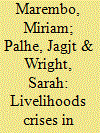

|
|
|
|
|
| Summary/Abstract |
The Vidarbha region in Maharashtra, India, home to 3.4 million smallholder farmers, is a major cotton-producing region in one of the wealthiest Indian states. However, between 1995 and 2013, more than 60,000 farmers took their own lives. Many of these suicides have been linked to extreme debt created by the expensive mono-cropping of Bt cotton. Some farming households have responded to these pressures by abandoning Bt cotton growing and turning to sustainable agriculture using traditional mixed-cropping methods. Yet the question remains: have the changes produced better livelihoods in Vidarbha? Using a food sovereignty framework, we assess the impact of these changes through an analysis of a 200-household survey across six districts in Vidarbha. We also explore the meaning of food sovereignty for those who practise it, seeking to better understand some of the complexities and experiences associated with the term.
|
|
|
|
|
|
|
|
|
|
|
|
|
|
|
|
| 6 |
ID:
161239
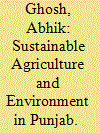

|
|
|
|
|
| Summary/Abstract |
David Ludden, (1999: 19) wrote, “agriculture is civilization at work on the land, humanizing nature and naturalizing the powers that human societies exert upon nature”. Agriculture is an art to obtain food from soil, and it gives humans an opportunity value nature. Agriculture is very fundamental process to the emergence of human society and culture. It is the primary source of income for the majority of the people of India. Agriculture predominantly influences the process and pace of economic development. Indian Agriculture sector contributes 17-18 per cent of the nation’s GDP and employs more than 50 per cent of total workforce in India.
|
|
|
|
|
|
|
|
|
|
|
|
|
|
|
|
| 7 |
ID:
141262


|
|
|
|
|
| Summary/Abstract |
The defining challenge of sustainable agriculture is the production of food and other agricultural products at an environmental cost that does not jeopardize the food security and general welfare of future generations. Feeding another three billion people in the face of climate change, biodiversity loss, and an environment already saturated with excess nitrogen and other reactive pollutants requires new approaches and new tools in the design and deployment of workable solutions. Solutions will be local but all will require an ecological systems approach that considers sustainable farming practices in the full context of ecosystems and landscapes. And their deployment will require an understanding of the social systems capable of building incentives that produce socially desired outcomes. Socioecological models for agriculture provide an opportunity to explore feedbacks, trade-offs, and synergies that can optimize and strengthen emerging connections between farming and society. With the right incentives, innovative research, and political will, a sustainable agriculture is within our reach.
|
|
|
|
|
|
|
|
|
|
|
|
|
|
|
|
|
|
|
|
|